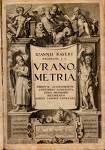
The most trusted name on the
internet since 1995
Postscriptum
By William Blades
 ALTHOUGH, strictly speaking, the following anecdote does not illustrate
any form of real injury to books, it is so racy, and in these days of
extravagant biddings so tantalizing, that I must step just outside the
strict line of pertinence in order to place it on record, It was sent to
me, as a personal experience, by my friend, Mr. George Clulow, a
well-known bibliophile, and “Xylographer” to “Ye Sette of ye Odde
Volumes.” The date is 1881. He writes:--
ALTHOUGH, strictly speaking, the following anecdote does not illustrate
any form of real injury to books, it is so racy, and in these days of
extravagant biddings so tantalizing, that I must step just outside the
strict line of pertinence in order to place it on record, It was sent to
me, as a personal experience, by my friend, Mr. George Clulow, a
well-known bibliophile, and “Xylographer” to “Ye Sette of ye Odde
Volumes.” The date is 1881. He writes:--
“Apropos of the Gainsborough ‘find,’ of which you tell in ‘The Enemies of Books,’ I should like to narrate an experience of my own, of some twenty years ago:
“Late one evening, at my father’s house, I saw a catalogue of a sale of furniture, farm implements and books, which was announced to take place on the following morning at a country rectory in Derbyshire, some four miles from the nearest railway station.
“It was summer time—the country at its best—and with the attraction of an old book, I decided on a day’s holiday, and eight o’clock the next morning found me in the train for C----, and after a variation in my programme, caused by my having walked three miles west before I discovered that my destination was three miles east of the railway station, I arrived at the rectory at noon, and found assembled some thirty or forty of the neighbouring farmers, their wives, men-servants and maid-servants, all seemingly bent on a day’s idling, rather than business. The sale was announced for noon, but it was an hour later before the auctioneer put in an appearance, and the first operation in which he took part, and in which he invited my assistance, was to make a hearty meal of bread and cheese and beer in the rectory kitchen. This over, the business of the day began by a sundry collection of pots, pans, and kettles being brought to the competition of the public, followed by some lots of bedding, etc. The catalogue gave books as the first part of the sale, and, as three o’clock was reached, my patience was gone, and I protested to the auctioneer against his not selling in accordance with his catalogue. To this he replied that there was not time enough, and that he would sell the books to-morrow! This was too much for me, and I suggested that he had broken faith with the buyers, and had brought me to C---- on a false pretence. This, however, did not seem to disturb his good humour, or to make him unhappy, and his answer was to call ‘Bill,’ who was acting as porter, and to tell him to give the gentleman the key of the ‘book room,’ and to bring down any of the books he might pick out, and he ‘would sell ‘em.’ I followed ‘Bill,’ and soon found myself in a charming nook of a library, full of books, mostly old divinity, but with a large number of the best miscellaneous literature of the sixteenth century, English and foreign. A very short look over the shelves produced some thirty Black Letter books, three or four illuminated missals, and some book rarities of a more recent date. ‘Bill’ took them downstairs, and I wondered what would happen! I was not long in doubt, for book by book, and in lots of two and three, my selection was knocked down in rapid succession, at prices varying from 1s. 6d. to 3s. 6d., this latter sum seeming to be the utmost limit to the speculative turn of my competitors. The bonne bouche of the lot was, however, kept back by the auctioneer, because, as he said, it was ‘a pretty book,’ and I began to respect his critical judgment, for ‘a pretty book’ it was, being a large paper copy of Dibdin’s Bibliographical Decameron, three volumes, in the original binding. Suffice it to say that, including this charming book, my purchases did not amount to Ł13, and I had pretty well a cart-load of books for my money—more than I wanted much! Having brought them home, I ‘weeded them out,’ and the ‘weeding’ realised four times what I gave for the whole, leaving me with some real book treasures.
“Some weeks afterwards I heard that the remainder of the books were literally treated as waste lumber, and carted off to the neighbouring town, and were to be had, any one of them, for sixpence, from a cobbler who had allowed his shop to be used as a store house for them. The news of their being there reached the ears of an old bookseller in one of the large towns, and he, I think, cleared out the lot. So curious an instance of the most total ignorance on the part of the sellers, and I may add on the part of the possible buyers also, I think is worth noting.”
How would the reader in this Year of Grace, 1887, like such an experience as that?
|
|
Home | Book Collecting | Folklore / Myth | Philately | Playing Cards | Literature | Contents
Please note: all applicable material on this website is protected by copyright law and may not be copied without express written permission.